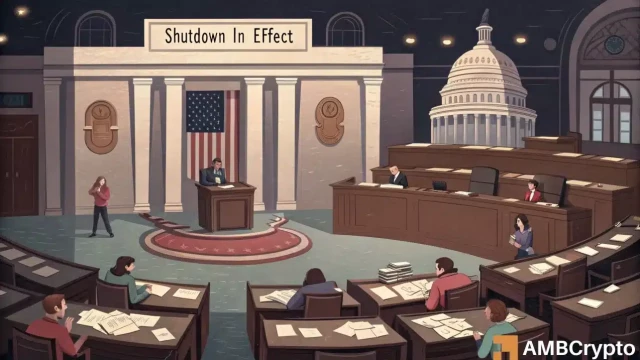
U.S. government shutdown delays crypto legislation to 2026
Summary
The ongoing U.S. government shutdown has thrown a wrench in the gears of the cryptocurrency industry, delaying crucial legislative progress until at least 2026. This political impasse threatens to stall crucial regulatory clarity and policy developments that the crypto sector has anxiously awaited for years.
Against the backdrop of a deeply divided Congress, the inability to pass essential funding bills has brought the legislative process to a grinding halt. With lawmakers consumed by partisan gridlock, the prospect of meaningful crypto-focused legislation being enacted in the near-term has all but vanished. This prolonged state of uncertainty casts a dark cloud over the future of digital assets in the world's largest economy.
Cryptocurrency advocates have long pushed for comprehensive federal oversight to provide regulatory guardrails and mainstream adoption. However, the current political stalemate has dashed hopes of progress on issues like clarifying the legal status of cryptocurrencies, establishing robust anti-money laundering (AML) and know-your-customer (KYC) frameworks, and developing a regulatory sandbox for crypto innovation.
Without clear rules of the road, the U.S. crypto market remains in a state of regulatory limbo, hampering institutional investment, limiting consumer protections, and stifling technological breakthroughs. Experts warn that this policy void risks driving digital asset activities overseas, as other nations forge ahead with crypto-friendly regulations.
Moreover, the delay in crypto legislation coincides with the looming 2026 midterm elections, which are expected to be highly contentious. In this charged political environment, the likelihood of bipartisan cooperation on complex financial technology issues appears slim. Lawmakers may be more inclined to grandstand on crypto rather than seeking pragmatic solutions.
The implications of this legislative gridlock extend far beyond the crypto industry itself. Failure to establish a clear regulatory framework jeopardizes the United States' position as a global leader in financial innovation, potentially ceding ground to more crypto-progressive nations. This could have ripple effects on the broader economy, dampening investment, limiting access to digital asset-based products and services, and undermining the country's technological competitiveness.
Ultimately, the current government shutdown and its impact on crypto legislation serve as a cautionary tale of the perils of political dysfunction. The crypto community, investors, and the general public alike will be forced to wait years for much-needed clarity, while the rest of the world forges ahead. Unless lawmakers can overcome their ideological divides and prioritize pragmatic policymaking, the U.S. risks falling behind in the global race to harness the transformative potential of blockchain and digital currencies.





